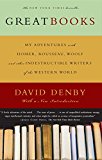Great Books: My Adventures with Homer, Rousseau, Woolf, and Other Indestructible Writers of the Western World
As September rolls around, do you find yourself longing to go back to school despite the fact that you graduated years ago? Would you remember how to read critically? Could you hold your own alongside today's college students? Would you find the Western literary classics culturally relevant and applicable to your life? At the age of 48, David Denby, film critic for New York magazine and contributing editor of The New Yorker, enrolled in Columbia University to rediscover the masterpieces of the Western tradition. He chronicles his journey in the New York Times bestseller Great Books: My Adventures with Homer, Rousseau, Woolf, and Other Indestructible Writers of the Western World. What brought Denby back to his alma mater was not a sense of nostalgia, but the current academic debate surrounding Western literature. This culture war centers on the left's denunciation of "dead white European males" as oppressive and exclusionary and the right's reverence of the Western canon as the foundation of traditional values and patriotism. Like many of the extremists engaged in the debate, Denby found his memories of these works faded and forgotten. "I possessed information without knowledge, opinions without principles, instincts without beliefs.... And I wanted to add my words to the debate from the ground up, beginning and ending in literature, never leaving the books themselves." Thus Denby returns to Columbia for the two "great books" courses: Literature Humanities and Contemporary Civilization. During his yearlong education he explores the difficulties of going back to reading seriously; analyzes today's college students; observes the teaching styles of four professors; and enters into a period of self-discovery as he learns to deal with life as a middle-aged student, father, and husband. Along the way he gains a new appreciation of writers such as Homer, Boccaccio, Austen, Nietzsche, Conrad, Machiavelli, Marx, and Woolf. He walks away from his experiences believing deeply that students today, more than ever, need this type of humanistic education and that both sides of the culture war are simplifying the Western tradition.

